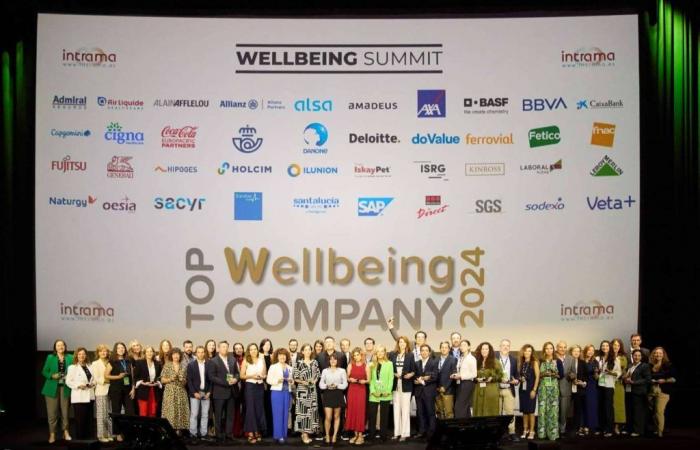The Corporate Wellbeing Manager report carried out by INTRAMA includes the best practices in Occupational Health and Corporate Wellbeing of the forty companies in Spain certified as TOP WELLBEING COMPANY. This report details initiatives, communication strategies, measurement and monitoring methods, as well as achievements and certifications in corporate well-being. Below, we detail the main findings of the study, structured in the pillars of well-being worked on in these organizations.
PILLARS OF WELL-BEING IN THE ORGANIZATION
The companies highlighted in the report approach well-being from a holistic perspective, focusing on key pillars such as physical health, emotional well-being, co-responsibility between professional and personal life, professional development and creating a positive work environment. The dimensions worked are:
Emotional Wellbeing
Physical well-being
Nutritional Wellness
Financial Wellbeing
Social Welfare
Environmental Wellbeing
CORPORATE WELLBEING INITIATIVES
The companies analyzed implement a variety of wellness programs with the aim of improving the quality of life of their staff. These initiatives include: Programs and Initiatives Implemented: Companies are implementing a variety of programs, including corporate gyms, yoga and meditation classes, healthy eating programs and psychological counseling. The effectiveness perceived by the staff is high, with significant improvements in physical and mental health reported by the different teams that make up the organization.
Adaptation to Diverse Needs: Initiatives are customized based on age, gender, geographic location, and level of work experience. For example, maternity and paternity programs, flexible hours and teleworking, as well as specific activities for young and senior employees, are offered.
Perception of Wellbeing: The perception of well-being in the company is generally positive. People especially value the work-life balance and the emotional support provided. Satisfaction surveys and discussion groups have been implemented to collect continuous feedback.
Wellness Training: The training includes workshops on stress management, emotional intelligence and healthy leadership. The majority of staff have participated in these trainings, reporting an improvement in their skills to manage stress and maintain a healthy balance between work and personal life.
Resources for Managers and Directors: Managers receive specific training and resources to support the well-being of their teams. This includes coaching programs, access to wellbeing consultants and assessment tools for the emotional state of staff.
COMMUNICATION
Communication plays a crucial role in promoting corporate well-being.
Internal Communication and Transparency: Internal communication is key to promoting a culture of well-being. Internal newsletters, intranets and regular meetings are used to keep employees informed about wellbeing initiatives. Transparency in communication helps create an environment of trust and mutual support.
Internal and External Communication Actions: Internally, awareness campaigns and thematic events are carried out. Externally, companies promote their well-being initiatives through active participation in professional events, social networks, collaborations with media, etc.
MEASUREMENT AND MONITORING
Evaluation of results: The results of wellness programs are measured by indicators such as productivity, talent retention and job satisfaction. Tools such as work environment surveys, performance evaluations and analysis of health and absenteeism data are used.
Emerging Trends: Current trends include an increased focus on mental health, teleworking and work flexibility, as well as the use of technology to monitor and improve wellbeing.
Companies are preparing to adapt to these trends by adopting flexible working policies and investing in digital wellness platforms.
AWARDS AND CERTIFICATIONS
Achievements in Corporate Wellbeing: Companies certified as TOP WELLBEING COMPANY have received various awards and certifications in recognition of their efforts in corporate well-being.
CONCLUSIONS
The Corporate Wellbeing Manager report highlights how leading companies in Occupational Health in Spain are establishing high standards in corporate well-being. These organizations are implementing effective initiatives, tailored to the diverse needs of their workforce, and are rigorously measuring their impacts. Internal and external communication, as well as support for managers and directors, are critical factors for the success of these initiatives.
Companies are also preparing to face emerging trends in the field of well-being, thus ensuring their sustainability and competitiveness in the future. The awards and certifications obtained are testimony to the commitment and achievements made in this area.
COMPANIES CERTIFIED TOP DIVERSITY COMPANY 2024
Admiral, Air Liquide HealthCare, Alain Afflelou, Allianz Partners, Alsa, Amadeus, Axa, Basf, BBVA, CaixaBank, Capgemini, Cigna, Coca Cola Europacifics Partner, Correos, Danone, Deloitte, DoValue, Ferrovial, Fetico, FNAC, Fujitsu, Generali , Hipoges, Holcim, ILunion, Iskaypet Group, Kinross Africa, Laboaral Kutxa, Leroy Merlin, Naturgy, Oesia, Sacyr, Sanitas, Santalucia, Sap, Securitas Direct, SGS, Sodexo, Sprinter, Veta+.


